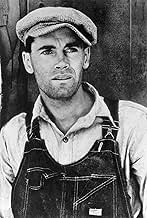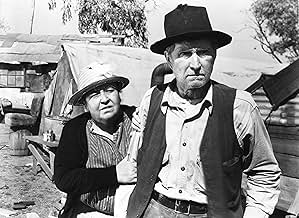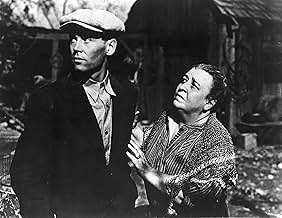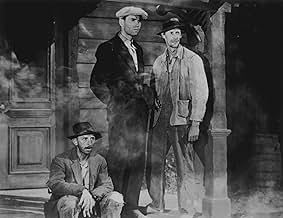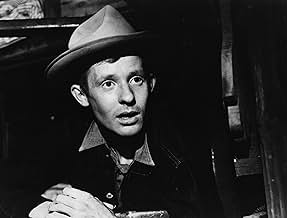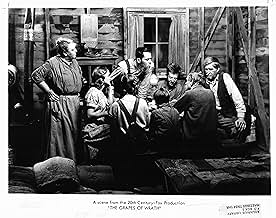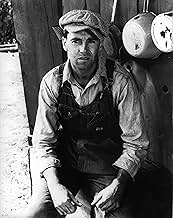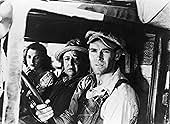An Oklahoma family, driven off their farm by the poverty and hopelessness of the Dust Bowl, joins the westward migration to California, suffering the misfortunes of the homeless in the Great... Read allAn Oklahoma family, driven off their farm by the poverty and hopelessness of the Dust Bowl, joins the westward migration to California, suffering the misfortunes of the homeless in the Great Depression.An Oklahoma family, driven off their farm by the poverty and hopelessness of the Dust Bowl, joins the westward migration to California, suffering the misfortunes of the homeless in the Great Depression.
- Won 2 Oscars
- 10 wins & 6 nominations total
- Director
- Writers
- All cast & crew
- Production, box office & more at IMDbPro
Storyline
Did you know
- TriviaPrior to filming, producer Darryl F. Zanuck sent undercover investigators out to the migrant camps to see if John Steinbeck had exaggerated about the squalor and unfair treatment meted out there. He was horrified to discover that Steinbeck had actually downplayed what went on in the camps.
- GoofsThe character, Noah (Frank Sully), after he's seen playing with his boat in the river, simply drops out of the story without any explanation, and does not appear again. In the book there is a brief reference to him going off on his own, but no explanation, whatever, is given in the film for his departure.
- Quotes
Tom Joad: I been thinking about us, too, about our people living like pigs and good rich land layin' fallow. Or maybe one guy with a million acres and a hundred thousand farmers starvin'. And I been wonderin' if all our folks got together and yelled...
Ma Joad: Oh, Tommy, they'd drag you out and cut you down just like they done to Casy.
Tom Joad: They'd drag me anyways. Sooner or later they'd get me for one thing if not for another. Until then...
Ma Joad: Tommy, you're not aimin' to kill nobody.
Tom Joad: No, Ma, not that. That ain't it. It's just, well as long as I'm an outlaw anyways... maybe I can do somethin'... maybe I can just find out somethin', just scrounge around and maybe find out what it is that's wrong and see if they ain't somethin' that can be done about it. I ain't thought it out all clear, Ma. I can't. I don't know enough.
Ma Joad: How am I gonna know about ya, Tommy? Why they could kill ya and I'd never know. They could hurt ya. How am I gonna know?
Tom Joad: Well, maybe it's like Casy says. A fellow ain't got a soul of his own, just little piece of a big soul, the one big soul that belongs to everybody, then...
Ma Joad: Then what, Tom?
Tom Joad: Then it don't matter. I'll be all around in the dark - I'll be everywhere. Wherever you can look - wherever there's a fight, so hungry people can eat, I'll be there. Wherever there's a cop beatin' up a guy, I'll be there. I'll be in the way guys yell when they're mad. I'll be in the way kids laugh when they're hungry and they know supper's ready, and when the people are eatin' the stuff they raise and livin' in the houses they build - I'll be there, too.
Ma Joad: I don't understand it, Tom.
Tom Joad: Me, neither, Ma, but - just somethin' I been thinkin' about.
- Alternate versionsInternational distributions (e.g. UK) have a short ~30 second prologue at the beginning to explain the historical context to the story to touch on the socio-economic problems in the US which arose during the Great Depression and the concurrent Dust Bowl.
- ConnectionsEdited into John Ford: The Man Who Invented America (2019)
- SoundtracksRed River Valley
(uncredited)
Traditional
Played during the opening credits and often in the score
Sung by Henry Fonda at the dance
Besides Fonda and Darwell, the supporting cast features plenty of good supporting players, including Charley Grapewin and John Carradine. All of them make their characters come alive believably. They also fit together well and complement one another's performances, which accentuates the themes involved in the struggles of the Joad family.
For all that the Steinbeck novel is so revered, and for all that his story is an often compelling depiction of its characters, with whom many in the era could identify, it would have been better if it had not been so heavy-handed. Even given that the times were bad, more balance in the characters outside of the family, and in the Joads' experiences, would have made it an even better story. Certainly, this is barely even noticeable when compared with the stories in many present-day movies and novels, which often dispense with any attempts at plausibility.
And that does not stop this adaptation from being a worthwhile and often moving film. Ford clearly appreciated the potential in the material, and he and the cast work together to make each character count, and to give meaning to each scene.
- Snow Leopard
- Oct 25, 2004
- Permalink
Details
- Release date
- Country of origin
- Language
- Also known as
- Highway 66
- Filming locations
- Topock, Arizona, USA(bridge crossing into California)
- Production company
- See more company credits at IMDbPro
Box office
- Budget
- $800,000 (estimated)
- Gross worldwide
- $7,304
- Runtime2 hours 9 minutes
- Color
- Aspect ratio
- 1.37 : 1
Contribute to this page



